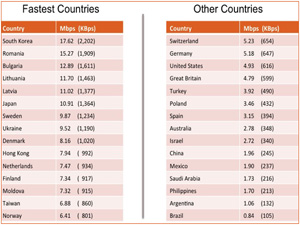



Date:22/09/11
 South Korea has the world's top Internet download speeds followed by Romania, Bulgaria, Lithuania and Latvia, according to a study released on Tuesday.
South Korea has the world's top Internet download speeds followed by Romania, Bulgaria, Lithuania and Latvia, according to a study released on Tuesday.
The United States placed just 26th in the analysis of the speed of worldwide Internet connections conducted by Pando Networks.
The average download speed in South Korea was 2,202 kilobytes per second, Pando said, with Romania (1,909 KBps), Bulgaria (1,611 KBps), Lithuania (1,462 KBps and Latvia (1,377 KBps) rounding out the top five.
Japan was next at 1,364 KBps, followed by Sweden (1,234 KBps), Ukraine (1,190 KBps), Denmark (1,020 KBps) and Hong Kong (992 KBps).
The average download speed in the United States was 606 KBps, slightly better than the worldwide average of 580 KBps, Pando said.
The study was based on 27 million downloads by 20 million computers in 224 countries from January through June 2011, Pando said.
The slowest average download speed was recorded in the Democratic Republic of Congo at 13 KBps, followed by the Central African Republic at 14 KBps and the Comoros at 23 KBps. "The disparities we found were striking," Pando chief executive Robert Levitan said in a release.
"While, in general, developed economies outpaced the developing world in average download speeds, big names such as the US, UK, France, China and Canada were not even close to being the fastest," Levitan said. Britain had average download speeds of 599 KBps, France 604 KBps, China 245 KBps, and Canada 579 KBps.
"Instead, we saw high speeds in markets such as Eastern Europe where focus on infrastructural development and favorable geography promote a higher level of connectivity," Levitan said. An interactive map of the data is available at chartsbin.com/view/2484.
South Korea tops in Internet download speed: study
 South Korea has the world's top Internet download speeds followed by Romania, Bulgaria, Lithuania and Latvia, according to a study released on Tuesday.
South Korea has the world's top Internet download speeds followed by Romania, Bulgaria, Lithuania and Latvia, according to a study released on Tuesday. The United States placed just 26th in the analysis of the speed of worldwide Internet connections conducted by Pando Networks.
The average download speed in South Korea was 2,202 kilobytes per second, Pando said, with Romania (1,909 KBps), Bulgaria (1,611 KBps), Lithuania (1,462 KBps and Latvia (1,377 KBps) rounding out the top five.
Japan was next at 1,364 KBps, followed by Sweden (1,234 KBps), Ukraine (1,190 KBps), Denmark (1,020 KBps) and Hong Kong (992 KBps).
The average download speed in the United States was 606 KBps, slightly better than the worldwide average of 580 KBps, Pando said.
The study was based on 27 million downloads by 20 million computers in 224 countries from January through June 2011, Pando said.
The slowest average download speed was recorded in the Democratic Republic of Congo at 13 KBps, followed by the Central African Republic at 14 KBps and the Comoros at 23 KBps. "The disparities we found were striking," Pando chief executive Robert Levitan said in a release.
"While, in general, developed economies outpaced the developing world in average download speeds, big names such as the US, UK, France, China and Canada were not even close to being the fastest," Levitan said. Britain had average download speeds of 599 KBps, France 604 KBps, China 245 KBps, and Canada 579 KBps.
"Instead, we saw high speeds in markets such as Eastern Europe where focus on infrastructural development and favorable geography promote a higher level of connectivity," Levitan said. An interactive map of the data is available at chartsbin.com/view/2484.
Views: 2257
©ictnews.az. All rights reserved.Similar news
- 24% of U.S. Adults have made phone calls on the Internet
- UNESCO puts sustainable learning online
- Australia gives incentives for the use of telehealth
- US launches computer programme for poor kids
- UN declares web access as human right
- Facebook growth slows in stalkerbase heartlands
- One Third of Millionaires Use Social Media
- Facebook Seeks Bigger Role in Software for Mobile Apps
- Icann increases web domain suffixes
- IBM launches new social networking platform for enterprises
- Google Notches One Billion Unique Visitors Per Month
- Internet providers cut international channel renting costs by 60%
- Azerbaijan launches standard time on internet
- Icann launches facility to ease DNSSec adoption
- Social network data mining yields worrying results for traditional media





















